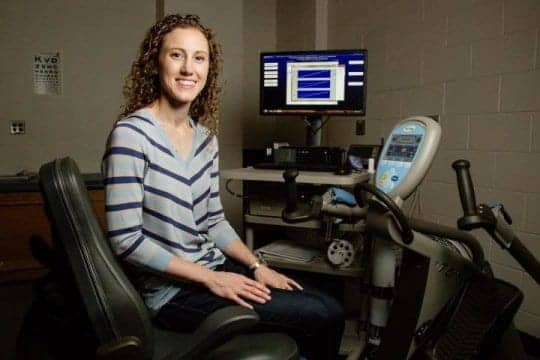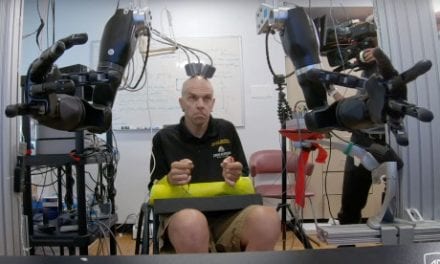
University of Illinois kinesiology and community health professor Lara Pilutti suggests in a recent study that conventional methods of testing physical fitness in people with multiple sclerosis may underestimate their cardiorespiratory fitness and muscular strength. (Photo courtesy of L. Brian Stauffer)
Patients with multiple sclerosis (MS) may have better cardiorespiratory fitness and physical strength than current tests indicate, researchers suggest.
Lara Pilutti, PhD, a professor of kinesiology and community health at University of Illinois, and her research team studied 64 patients with MS who ranged in age from 18 to 64, and had mobility disabilities from MS that varied from mild to severe.
The research team found that the participants had significantly higher peak aerobic capacity and muscle strength when recumbent steppers and computerized dynamometers were used for the tests, compared with arm ergometers and handheld dynamometers, according to a media release from University of Illinois at Urbana-Champaign.
The participants’ muscle strength ranged from 60% to 173% greater, depending on the leg muscle group tested, when measured with a computerized dynamometer versus a handheld device. Accordingly, participants’ peak aerobic capacity was 32% greater when tested with a recumbent stepper versus an arm ergometer, an upper-body exercise machine that is similar to pedaling a bike with one’s hands, the release explains.
A computerized dynamometer measures the amount of torque or muscle force that users exert to move a lever with their legs.
Pilutti notes in the release that the accuracy of handheld dynamometers in muscle-strength testing has been challenged in prior research because the results can vary greatly, depending on the strength of the person administering the test and providing the resistance as the participant pushes against the device.
The study was published recently in the Journal of Neorologic Physical Therapy.
Pilutti explains in the release that although many people with significant disability due to MS are often excluded from research studies, they could reap great benefits from exercise training. Appropriate exercise, she adds, could help manage MS symptoms such as fatigue, muscle weakness, and problems with balance and coordination.
A significant health threat among patients with MS is sedentary behavior, according to the researchers, in the release.
“We know there are some serious health consequences in terms of morbidity and mortality, so inactivity is a pretty significant issue,” Pilutti says, in the release.
“We need to develop some interventions for both people with MS and in the general population to get everyone to be more active. But that’s going to be a challenge for people who have more severe mobility disabilities,” she adds.
[Source(s): University of Illinois at Urbana-Champaign, Science Daily]




